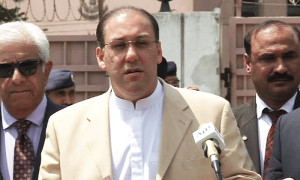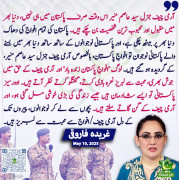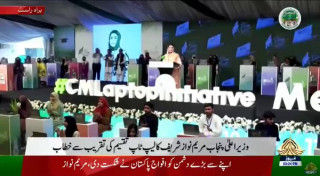QaiserMirza
Chief Minister (5k+ posts)
Marriage Etiquette In Islam
Marriage Etiquette in Islam
Marriage is a gift, a special bond between man and woman, husband and wife. Much has been written about how we should behave towards a spouse after marriage, but no texts are more appropriate than the teachings of the Qur'an and Sunna. With this article, we have attempted to bring together information on marriage etiquette from a variety of sources, which we hope will guide and inspire you in this most wonderful relationship.
A spouse has been described as "a partner, companion and best friend". The closeness between spouses is unlike any other relationship. The following verse from the Qur'an sums it up perfectly: "They are your garments and you are their garments" (Surah Al Baqarah 2:187). This illustrates how "spouses provide one another with the protection, the comfort, the cover, the support and the adornment that garments provide to humans".
The first few years of marriage are often the most challenging as this is the period when husband and wife are getting to know each other better and adjusting to each other's habits and personalities, as well as to their new roles in society. There are, however, a number of matters of etiquette for married couples to observe which will help to ensure harmony and understanding during this time of transition, as well as in the long term.
In this article:
1. Expectations
2. Spending Time Together
3. Sexual Relations
4. Family and Friends
5. Commitment to Allah
1. Expectations
Everyone has different expectations of marriage but it important that these expectations are realistic. The "happy ever after" portrayed in many Hollywood and Bollywood films is achievable but we must remember that it takes time, patience and effort to build and maintain this strong marital bond.
First and foremost, do not expect your partner to be perfect. Only Allah is perfect. All of us have our good points and our bad points, and husbands and wives must learn to delight in the good points and accept the bad. We cannot expect to always agree with our spouses. They are not an extension of us; they are their own person with their own personalities, views, likes and dislikes, which we should try to understand rather than change.
A happy marriage cannot be taken for granted. It requires constant giving from both sides. Be mindful that even small things can make a huge difference to the relationship. Be honest with your partner. Both partners in marriage should feel free to speak their mind but must be careful not to hurt the other's feelings. Pay each other compliments and show appreciation for the things that your spouse does for you.
Problems between couples may arise from a lack of information before marriage. Therefore it is important to discuss your future expectations beforehand. Such issues could include whether the wife will work outside the home, when the couple plan to have children, where and with whom (if anyone) they should live, how they will work together to ensure a happy marriage, etc.
In marriage, the husband takes the lead. However, according to Islam, marriage is a partnership. Rather than being a dictator in the relationship, the husband is seen more as a shepherd who is responsible for and to his flock. In Islam, a leader is one who serves, manages, provides and nourishes and does so with humbleness and humility. The husband is expected to consult his wife (Shura), especially in relation to family matters, and to respect and value her opinion.
2. Spending Time Together
It is important to make time for each other and to enjoy spending time together. It is only through being together that we can learn to communicate effectively with our spouses, to share our hopes and fears and to feel responsible for each other. When this bond is strong, the couple becomes a "team", working together for the same ends.
Establish your own rituals. Set aside time together. This is especially important if both partners are working. This time can be spent praying together, deciding upon finances or a weekly menu, pursuing a hobby together or simply taking time to enjoy each other's company.
Your marital bond will enable you to build a close relationship, both physically and emotionally. However, giving each other sufficient space in the relationship will bring balance. In addition, show forgiveness if your partner makes a mistake and do not hold grudges. Develop closeness and fondness by laughing and having fun together. Plan for your future together. This will bring peace of mind and cement your relationship.
3. Sexual Relations
Time and effort are required to establish a sexual relationship in marriage, which is in tune with the needs of each partner. It is essential that both are informed about Islamic sexual etiquette, especially what is permissible (Halal) and what is forbidden (Haram).
Revealing secrets is un-Islamic. Therefore, partners should never discuss bedroom matters with others. If discussion becomes necessary, for example, due to medical matters or where there is a need for a marriage mentor, this should take place only with an authority figure that has both partners' interests at heart.
Our Prophet recommends that husbands and wives make themselves physically attractive to each other and to pay even more attention to this after marriage. Spouses should take care of themselves, to look good and stay clean in order not to cause offence to the other. Elegance and beautification are encouraged in Islam.
4. Family and Friends
Islam demands that a special effort should be made to show kindness and respect to your spouse's family. A bond with your in-laws does not develop overnight. It requires regular, healthy contact, openness and a willingness to accept your differences. Acceptance of your spouse's family and showing them hospitality can only strengthen the bond between you and your partner and help to make marital relations easier.
In line with Islamic rules of social relations we should avoid sarcasm, backbiting and calling each other offensive nicknames. Instead, we should make a special effort to respect each other as family members. Everyone is different. Therefore, do not compare your partner to members of your family and do not compare in-laws to your parents. This can lead to friction and resentment.
Friends are important to married couples and it can be useful to schedule a "friends time" where husband and wife can meet privately with friends. The couple should also make an effort to make family friends, friendships with other married couples. However, of the highest importance is to develop a deep and lasting friendship with your spouse.
5. Commitment to Allah
As Islam is a way of life, it is an integral part of the couple's relationship. They are bound by their common faith and in their desire to please Allah. Each should be responsible for enhancing their partner's spiritual development. Support each other in your obedience to Allah and make time to pray together. This will strengthen your relationship with Allah and, in turn, ensure that your marital bond remains strong.
Marriage Etiquette in Islam
Marriage is a gift, a special bond between man and woman, husband and wife. Much has been written about how we should behave towards a spouse after marriage, but no texts are more appropriate than the teachings of the Qur'an and Sunna. With this article, we have attempted to bring together information on marriage etiquette from a variety of sources, which we hope will guide and inspire you in this most wonderful relationship.
A spouse has been described as "a partner, companion and best friend". The closeness between spouses is unlike any other relationship. The following verse from the Qur'an sums it up perfectly: "They are your garments and you are their garments" (Surah Al Baqarah 2:187). This illustrates how "spouses provide one another with the protection, the comfort, the cover, the support and the adornment that garments provide to humans".
The first few years of marriage are often the most challenging as this is the period when husband and wife are getting to know each other better and adjusting to each other's habits and personalities, as well as to their new roles in society. There are, however, a number of matters of etiquette for married couples to observe which will help to ensure harmony and understanding during this time of transition, as well as in the long term.
In this article:
1. Expectations
2. Spending Time Together
3. Sexual Relations
4. Family and Friends
5. Commitment to Allah
1. Expectations
Everyone has different expectations of marriage but it important that these expectations are realistic. The "happy ever after" portrayed in many Hollywood and Bollywood films is achievable but we must remember that it takes time, patience and effort to build and maintain this strong marital bond.
First and foremost, do not expect your partner to be perfect. Only Allah is perfect. All of us have our good points and our bad points, and husbands and wives must learn to delight in the good points and accept the bad. We cannot expect to always agree with our spouses. They are not an extension of us; they are their own person with their own personalities, views, likes and dislikes, which we should try to understand rather than change.
A happy marriage cannot be taken for granted. It requires constant giving from both sides. Be mindful that even small things can make a huge difference to the relationship. Be honest with your partner. Both partners in marriage should feel free to speak their mind but must be careful not to hurt the other's feelings. Pay each other compliments and show appreciation for the things that your spouse does for you.
Problems between couples may arise from a lack of information before marriage. Therefore it is important to discuss your future expectations beforehand. Such issues could include whether the wife will work outside the home, when the couple plan to have children, where and with whom (if anyone) they should live, how they will work together to ensure a happy marriage, etc.
In marriage, the husband takes the lead. However, according to Islam, marriage is a partnership. Rather than being a dictator in the relationship, the husband is seen more as a shepherd who is responsible for and to his flock. In Islam, a leader is one who serves, manages, provides and nourishes and does so with humbleness and humility. The husband is expected to consult his wife (Shura), especially in relation to family matters, and to respect and value her opinion.
2. Spending Time Together
It is important to make time for each other and to enjoy spending time together. It is only through being together that we can learn to communicate effectively with our spouses, to share our hopes and fears and to feel responsible for each other. When this bond is strong, the couple becomes a "team", working together for the same ends.
Establish your own rituals. Set aside time together. This is especially important if both partners are working. This time can be spent praying together, deciding upon finances or a weekly menu, pursuing a hobby together or simply taking time to enjoy each other's company.
Your marital bond will enable you to build a close relationship, both physically and emotionally. However, giving each other sufficient space in the relationship will bring balance. In addition, show forgiveness if your partner makes a mistake and do not hold grudges. Develop closeness and fondness by laughing and having fun together. Plan for your future together. This will bring peace of mind and cement your relationship.
3. Sexual Relations
Time and effort are required to establish a sexual relationship in marriage, which is in tune with the needs of each partner. It is essential that both are informed about Islamic sexual etiquette, especially what is permissible (Halal) and what is forbidden (Haram).
Revealing secrets is un-Islamic. Therefore, partners should never discuss bedroom matters with others. If discussion becomes necessary, for example, due to medical matters or where there is a need for a marriage mentor, this should take place only with an authority figure that has both partners' interests at heart.
Our Prophet recommends that husbands and wives make themselves physically attractive to each other and to pay even more attention to this after marriage. Spouses should take care of themselves, to look good and stay clean in order not to cause offence to the other. Elegance and beautification are encouraged in Islam.
4. Family and Friends
Islam demands that a special effort should be made to show kindness and respect to your spouse's family. A bond with your in-laws does not develop overnight. It requires regular, healthy contact, openness and a willingness to accept your differences. Acceptance of your spouse's family and showing them hospitality can only strengthen the bond between you and your partner and help to make marital relations easier.
In line with Islamic rules of social relations we should avoid sarcasm, backbiting and calling each other offensive nicknames. Instead, we should make a special effort to respect each other as family members. Everyone is different. Therefore, do not compare your partner to members of your family and do not compare in-laws to your parents. This can lead to friction and resentment.
Friends are important to married couples and it can be useful to schedule a "friends time" where husband and wife can meet privately with friends. The couple should also make an effort to make family friends, friendships with other married couples. However, of the highest importance is to develop a deep and lasting friendship with your spouse.
5. Commitment to Allah
As Islam is a way of life, it is an integral part of the couple's relationship. They are bound by their common faith and in their desire to please Allah. Each should be responsible for enhancing their partner's spiritual development. Support each other in your obedience to Allah and make time to pray together. This will strengthen your relationship with Allah and, in turn, ensure that your marital bond remains strong.

































